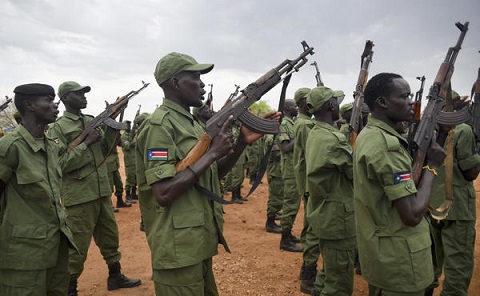
UN threatens South Sudan with arms embargo and sanctions

The U.N. Security Council demanded an immediate end to fighting in South Sudan on Thursday and threatened to consider an arms embargo and sanctions to prevent warring parties from violating a December cease-fire agreement.
A U.S.-drafted resolution, adopted unanimously, also expresses the council’s intention to consider sanctions “against those who take actions that undermine the peace, stability, and security of South Sudan.”
The resolution doesn’t impose an arms embargo but “expresses its intention to consider all measures, including an arms embargo, as appropriate, to deprive the parties of the means to continue fighting and to prevent violations” of the cease-fire agreement.
The resolution extends the mandate of the U.N. peacekeeping force in South Sudan until March 15, 2019 and maintains the 17,000 troop ceiling, including a regional protection force of up to 4,000 troops and 2,101 international police personnel.
There were high hopes that South Sudan would have peace and stability after its independence from neighboring Sudan in 2011. But the country plunged into ethnic violence in December 2013 when forces loyal to President Salva Kiir, a Dinka, started battling those loyal to Riek Machar, his former vice president who is a Nuer. A peace deal signed in August 2015 didn’t stop the fighting — and a cessation of hostilities agreement this past Dec. 24 was broken within hours.
The conflict has killed tens of thousands of people and forced over 4 million to flee their homes, more than 1.8 million of them leaving the country in what has become the world’s fastest growing refugee crisis.
The Security Council reiterated its “increasingly grave alarm and concern regarding the political, security, economic, and humanitarian crisis in South Sudan, and subsequent violence caused by the country’s political and military leaders since December 2013.” It emphasized that there is no military solution to the conflict.
South Sudan’s deputy U.N. ambassador Joseph Moum Malok welcomed the renewal of the peacekeeping mission’s mandate but said it was “unfortunate that the council chooses to politicize the peacekeeping resolution.”
He reminded the U.N. that Kiir’s government was elected, and said the U.N. should work with it “to address the practical problem facing the country.”
“It is one thing to condemn the leadership of the country and another to threaten the imposition of an arms embargo and sanctions,” Malok said.
“My country’s position is that punitive actions and punishment are counter-productive,” he said. “The only solution to the conflict in South Sudan is through a political process.”






